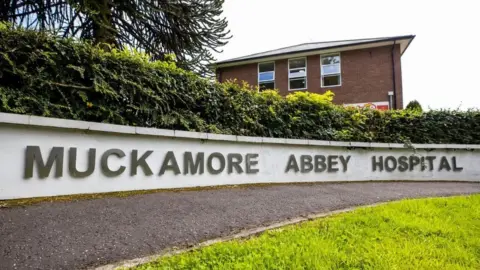Muckamore: Northern Trust 'not always aware' of safeguarding issues
 PA Media
PA MediaA director at the Northern Health Trust has told the Muckamore Abbey Hospital inquiry it was "not always aware" of safeguarding issues affecting its own patients.
Dr Petra Corr was giving evidence about the relationships between trusts regarding Muckamore.
She told the inquiry the "vast majority of safeguarding was dealt with through the Muckamore team".
The inquiry heard patients were often admitted from different health trusts.
Muckamore Abbey Hospital provides facilities for adults with special needs and is run by the Belfast Health Trust.
A major police investigation began in 2017 after allegations of ill-treatment began to emerge.
Incidents of concern
Dr Corr, the Northern Trust's director of mental health, learning disability and community wellbeing, was asked about the role played by the Trust when "incidents of concern" were raised regarding its own patients living at Muckamore.
"There would have been some levels of communication with the Northern Trust named worker and depending upon the nature of the issues that may or may not have been communicated to the Northern Trust," she said.
"We were not always aware of all safeguarding issues that had occurred in relation to individuals who were our patients."
Northern Trust patients admitted to Muckamore were allocated a named worker from a community learning disability team within the Northern Trust, Dr Corr said.
'No set procedure'
The Chair of the Inquiry asked Dr Corr if a concern raised at a meeting regarding a patient would be followed up by the named worker and if any record would be kept.
Dr Corr said the issues were dealt with through Muckamore as "they had the lead responsibility in relation to cases" and a record would be kept in the named workers file.
She said care planning meetings for patients were typically organised by the hospital and community named workers from the Trust were invited to attend these as well as ward rounds.
There was an expectation community named workers would attend these meetings but there was no requirement to do so, the inquiry heard.
Counsel for the inquiry asked Dr Corr whether formalising contact between trusts or requiring community named workers to attend meetings might have been "beneficial".
Dr Corr said: "I think the professional to professional discussions around individual clients were and are appropriate and the recording of that within the case files remains the most appropriate way to do that.
"Certainly if I was establishing a service today I would be seeking clarity on attendance at meetings at a specified level."
While there was "joint working" between the hospital and the named worker, Dr Corr said it wasn't "set in a procedure and would have varied potentially from one individual to another".
She added that, when a patient was admitted to the hospital, all care was "coordinated and led through the Belfast Trust".
Dr Corr was also asked whether minutes of care planning meetings or ward rounds were ever taken down.
She said that from memory there were meetings with minutes and that ward rounds "probably had action notes or notes that were recorded within patient files".
Parts of a statement she previously provided to the inquiry, largely relating to the period after the trust was established in 2007, were read to her during today's hearing.
The inquiry continues.
